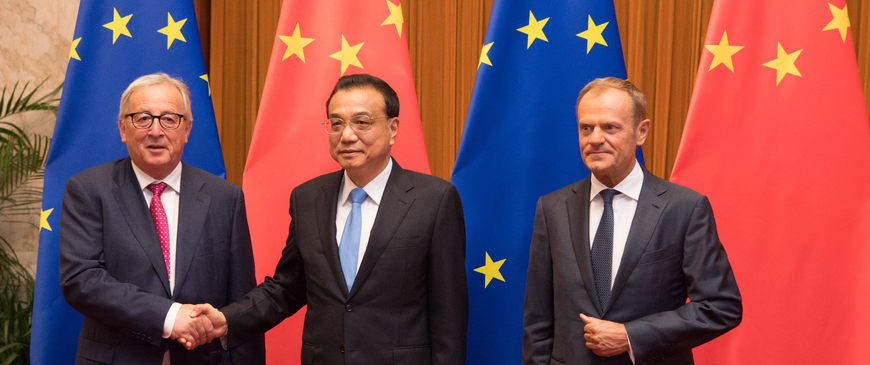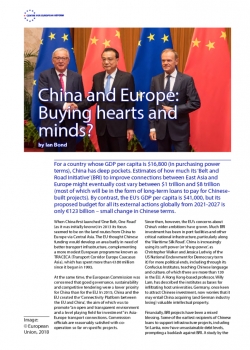
China and Europe: Buying hearts and minds?
The EU does not need to compete financially with China’s grandiose ‘Belt and Road Initiative’ (BRI) everywhere. But it should at least stop China buying the support of EU member-states.
For a country whose GDP per capita is $16,800 (in purchasing power terms), China has deep pockets. Estimates of how much its ‘Belt and Road Initiative’ (BRI) to improve connections between East Asia and Europe might eventually cost vary between $1 trillion and $8 trillion (most of which will be in the form of long-term loans to pay for Chinese-built projects). By contrast, the EU’s GDP per capita is $41,000, but its proposed budget for all its external actions globally from 2021-2027 is only €123 billion – small change in Chinese terms.
When China first launched ‘One Belt, One Road’ (as it was initially known) in 2013 its focus seemed to be on the land routes from China to Europe via Central Asia. The EU thought Chinese funding would develop an area badly in need of better transport infrastructure, complementing a more modest European programme known as TRACECA (Transport Corridor Europe Caucasus Asia), which has spent more than €180 million since it began in 1993.
The #EU’s concerns about #China’s wider ambitions have grown. Much #BRI investment has been in ports & other critical national infrastructure. China is increasingly using its soft power (or ‘sharp power’) for more political ends.
At the same time, the European Commission was concerned that good governance, sustainability and competitive tendering were a lower priority for China than for the EU. In 2015, China and the EU created the ‘Connectivity Platform between the EU and China’, the aim of which was to promote “an open and transparent environment and a level playing field for investment” in Asia-Europe transport connections. Commission officials are reasonably satisfied with co-operation so far on specific projects.
Since then, however, the EU’s concerns about China’s wider ambitions have grown. Much BRI investment has been in port facilities and other critical national infrastructure, particularly along the ‘Maritime Silk Road’. China is increasingly using its soft power (or ‘sharp power’, as Christopher Walker and Jessica Ludwig of the US National Endowment for Democracy term it) for more political ends, including through its Confucius Institutes, teaching Chinese language and culture, of which there are more than 130 in the EU. A Hong Kong-based professor, Willy Lam, has described the institutes as bases for infiltrating host universities. Germany, once keen to attract Chinese investment, now worries that it may entail China acquiring (and German industry losing) valuable intellectual property.
The #EU has had to reappraise #China’s role in global security. China’s assertive attitude to friends of the EU like #Japan is worrying. And in 2017, China sent ships to take part in joint naval exercises with #Russia in the Baltic Sea.
Financially, BRI projects have been a mixed blessing. Some of the earliest recipients of Chinese loans to support infrastructure projects, including Sri Lanka, now have unsustainable debt levels, prompting a backlash against BRI. A study by the Center for Global Development (a US think-tank) in March 2018 identified eight countries that had received Chinese loans for projects, including EU candidate country Montenegro, as particularly vulnerable to debt distress.
Moreover, Europe has had to reappraise China’s role in global security. China’s assertive attitude to friends of the EU like Japan and to South-East Asian countries (with which China disputes ownership of the South China Sea) has been a worry for some years. China’s military co-operation with Russia has grown, and spread to the European theatre. In 2017, China sent ships to take part in joint naval exercises with Russia in the Baltic Sea.
Europe has begun to hedge against China’s growing power. Before the latest Asia-Europe Meeting (ASEM – a summit of 51 Asian and European leaders, which took place in Brussels in October), the Council of the EU endorsed a joint communication from the Commission and the European External Action Service on the elements of an EU strategy for connecting Europe and Asia. The EU’s aim is to work with like-minded countries in Asia, including Japan and India, not exclusively with China, and to strengthen the links between the EU and (for instance) members of ASEAN in a way which is rules-based and sustainable. But to compete with China, Europe will need to invest more time and money in Asia.
The #EU should not go overboard in recalibrating its approach to #China. There are many issues on which the EU and China still need to work together, particularly in the era of #Trump.
The EU is working towards adopting a foreign investment screening regulation, aimed at China among other countries. While leaving it to national governments to decide whether to accept foreign investment in sensitive sectors, the regulation would give other member-states and the Commission the opportunity to comment, and oblige the state concerned to take these views into account. There would be no enforcement mechanism, but even so some states, including Italy, are resisting the regulation. Italy hopes to emulate other EU member-states, including the Czech Republic, Greece, Hungary and Malta, that have memorandums of understanding with China on participation in BRI.
The EU’s problem is that China is already leveraging its economic importance to get European countries and businesses to lobby for its interests. Hungary is the biggest recipient of Chinese investment in Central Europe, and China plans to build a high-speed rail link between Budapest and Belgrade. The Chinese firm COSCO operates the Greek port of Piraeus, in which it invested when the Greek financial crisis was at its worst. Big member-states like France and Germany have their own bilateral dialogues with China, outside any EU framework.
The Commission has been concerned for some time that the ’16 + 1’ process (which brings together China and 16 Central and Eastern European states), though ostensibly about trade and people-to-people links, is undermining EU cohesion. China was able to use EU member-states such as Hungary and Greece to block an EU statement in 2016 supporting the Permanent Court of Arbitration’s ruling against China’s territorial claims in the South China Sea, and an EU statement in 2017 at the UN criticising China’s human rights record. Following a UN report that a million members of the Muslim Uighur minority are detained in re-education camps in the Xinjiang region, the EU ambassador in Beijing in Beijing is one of 15 signatories to a November 2018 letter to the Chinese authorities expressing concern, but in a sign of disunity most EU member-states’ ambassadors have not signed.
The EU should not go overboard in recalibrating its approach to China. There are many issues on which the EU and China still need to work together, particularly in the era of Donald Trump. Despite many EU-China trade disputes, Trump’s hostility to the World Trade Organisation (WTO) has driven them together: both recognise their need for a functioning WTO, able to make, monitor and enforce rules. Both also understand that they have a major role to play in shifting the world to a low-carbon economy, regardless of Trump’s rejection of the science of climate change. And they are on the same side (along with Russia) in wanting to preserve the Iran nuclear deal, from which Trump has withdrawn the US.
Member-states should discuss frankly how the #EU can pursue a balanced policy of co-operation with #China where possible, and criticism where necessary.
But the EU cannot afford to tolerate a situation in which its unity in dealing with China is undermined by Beijing’s financial leverage in individual member-states. The Commission and Parliament are right to push for screening of future investments; but that will not mitigate China’s current influence. There must be more transparency about the value and the quality of Chinese investments in the EU. Member-states should discuss frankly how the EU can pursue a balanced policy of co-operation with China where possible, and criticism where necessary. And there must be more willingness to challenge European leaders who seem more interested in taking Chinese cash than defending European values.
Ian Bond is director of foreign policy at the Centre for European Reform.

